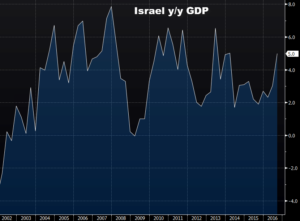Israel Cut Inflation Rate by 31 Percentage Points in 1981, JTA, Jan. 19, 1982.
 Israel succeeded in reducing inflation by 31 percentage points last year while increasing its gross national product, boosting exports and raising productivity, it was reported by the Israel Economic Mission in New York.
Israel succeeded in reducing inflation by 31 percentage points last year while increasing its gross national product, boosting exports and raising productivity, it was reported by the Israel Economic Mission in New York.
At the same time, unemployment was kept down to the 1980 level of 5 percent and the civilian balance-of-payments deficit declined by 5 percent, Uri Oren, spokesman for the Mission, announced. The report was issued following the release of the 1981 cost-of-living index of the Central Bureau of Statistics in Jerusalem last Friday.
The December inflation rate was 5.2 percent, bringing the total for the year to 101.5 percent. The 1980 figure was 133 percent and the inflation rate in 1979 was III percent. The 1981 decline in the rate of inflation, coupled with strength in other sectors of the economy, was “in keeping with the timetable for economic recovery set by Finance Minister Yoram Aridor when he took office last February and declared his goal to be the reduction of inflation in 1981 to approximately 100 percent,” Oren said.
He noted that Israelis are protected against inflation by regular, automatic cost-of-living increases linked to the consumer price index. In addition, Israel’s foreign exchange laws permit citizens to hold hard currencies and invest in savings plans indexed to the inflation rate.
The statistical report also revealed that the “consumption basket” of goods and services use by the poorest tenth of the population rose by 90.7 percent — less than the rate of inflation. In comparison, the goods and services used by the wealthiest 10 percent of the population went up by 106 percent. This development reversed the trend of recent years, in which the impact of inflation was felt more acutely by the poor, the spokesman said.
GNP Up Five Percent
According to the report, Israel’s gross national product rose five percent in 1981 to exceed $20 billion, compared to a rise of 2.3 percent in 1980. Industrial output went up by seven percent after a drop of three percent in 1980. Agricultural production increased by four percent, the same rise registered in 1980. Construction, however, declined by three percent after rising four percent the previous year.
In a statement, the Israeli Economic Mission in New York pointed out that major economic indicators rose and inflation dropped last year “without the imposition of drastic measures such as freezing prices and wages or cancelling subsidies. This is the basic policy of Finance Minister (Yoram) Aridor, who also made clear that he would not fight inflation with unemployment,” the statement said.



